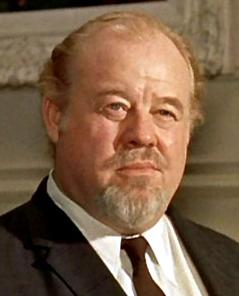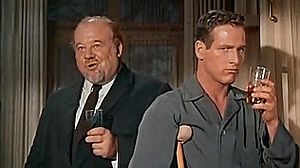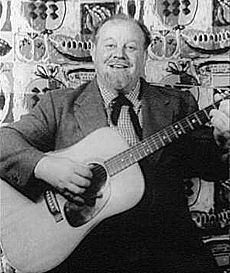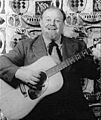Burl Ives facts for kids
Quick facts for kids
Burl Ives
|
|
|---|---|

Ives in Cat on a Hot Tin Roof (1958)
|
|
| Born |
Burl Icle Ivanhoe Ives
June 14, 1909 Hunt City, Illinois, U.S.
|
| Died | April 14, 1995 (aged 85) Anacortes, Washington, U.S.
|
| Burial place | Mound Cemetery Hunt City Township, Jasper County, Illinois, US |
| Occupation |
|
| Years active | 1929–1993 |
| Spouse(s) |
|
| Children | 1 |
| Awards |
|
| Musical career | |
| Genres | |
| Instruments | |
| Associated acts |
|
| Military career | |
| Service/ |
|
| Years of service | 1942–1943 |
Burl Icle Ivanhoe Ives (born June 14, 1909 – died April 14, 1995) was a famous American musician, actor, and author. His career lasted for over 60 years!
Burl Ives started by traveling around and singing. He played the guitar and later had his own radio show called The Wayfaring Stranger. This show helped make traditional folk songs very popular. In 1942, he was in a show called This Is the Army and became a big star on CBS Radio.
In the 1960s, he also became a successful country music singer. He had hit songs like "A Little Bitty Tear" and "Funny Way of Laughin'". Burl Ives was also a well-known movie actor in the 1940s and 1950s. He acted in films like So Dear to My Heart (1948) and Cat on a Hot Tin Roof (1958). He won an Academy Award for Best Supporting Actor for his role in The Big Country (1958).
Many people connect Burl Ives with Christmas. He was the voice of Sam the Snowman, who narrated the classic 1964 Christmas TV special Rudolph the Red-Nosed Reindeer. He also sang songs for the special, including "A Holly Jolly Christmas" and "Rudolph the Red-Nosed Reindeer". These songs are still very popular during the holidays today.
Contents
Life and Career
Early Life
Burl Ives was born in Hunt City, Illinois, a small town in Jasper County, Illinois. His parents were Levi "Frank" Ives and Cordelia "Dellie" White. He had six brothers and sisters. His father was a farmer and later worked as a contractor.
One day, Burl was singing in the garden with his mother. His uncle heard them and invited Burl to sing at a local gathering. Burl sang an old folk song called "Barbara Allen". Everyone was very impressed with his singing.
From 1927 to 1929, Burl went to Eastern Illinois State Teachers College. He played football there. One day, he decided college wasn't for him and left. Sixty years later, the school named a building after him! Burl Ives was also a member of The Order of DeMolay and later became a high-ranking member of Scottish Rite Freemasonry.
In 1929, Burl tried to record a song called "Behind the Clouds". However, the recording was not used.
1930s–1940s: Traveling Singer and Radio Star
In the early 1930s, Burl Ives traveled all over the U.S. He sang and played his banjo to earn money. He sometimes faced challenges while traveling. Around 1931, he started performing on WBOW radio in Indiana. He also took some classes at Indiana State Teachers College and the Juilliard School in New York.
In 1938, he made his first appearance on Broadway in the musical The Boys from Syracuse. In 1939, he moved to Los Angeles and shared an apartment with his friend, actor Eddie Albert.
In 1940, Burl Ives started his own radio show called The Wayfaring Stranger. He named it after one of his favorite songs. Over the next ten years, he helped make many old folk songs famous. These included "Foggy Dew", "The Blue Tail Fly", and "Big Rock Candy Mountain". He also sang with a group called the Almanac Singers. This group included famous folk singers like Woody Guthrie and Pete Seeger. They sang songs about peace and later about supporting the war effort.
In early 1942, Burl Ives joined the United States Army. He was part of the cast of Irving Berlin's show This Is the Army. He was honorably discharged in 1943 for health reasons. After that, he worked for CBS Radio in New York City. In 1944, he recorded The Lonesome Train, a song about the life of Abraham Lincoln.
In 1946, Burl Ives acted as a singing cowboy in the film Smoky. In 1947, he recorded "The Blue Tail Fly" with the popular The Andrews Sisters. This song became a big hit. His song "Lavender Blue" was also a hit and was nominated for an Academy Award for Best Original Song after he sang it in the 1949 movie So Dear to My Heart.
1950s–1960s: Movies and Challenges

In the 1950s, Burl Ives faced some difficulties because of his past connections to certain groups. He worked with a government committee to clear his name, which allowed him to continue his acting career. This caused some disagreements with other folk singers, like Pete Seeger, but they later made up. In 1993, Burl Ives and Pete Seeger sang "Blue Tail Fly" together at a concert.
During this time, Burl Ives appeared in many more films. Some of his movie roles included Sam the Sheriff in East of Eden and Big Daddy in Cat on a Hot Tin Roof. He also won an Academy Award for Best Supporting Actor for his role in The Big Country.
When he couldn't work in America for a short time, he often performed on BBC Radio's Children's Hour. He sang favorites like "Big Rock Candy Mountain" and "She'll Be Coming 'Round the Mountain". He also appeared as a mystery guest on the TV show What's My Line in 1955 and 1959.
1960s–1990s: Country Hits and Christmas Fame
In the 1960s, Burl Ives started singing country music more often. In 1962, he released three popular songs: "A Little Bitty Tear", "Call Me Mister In-Between", and "Funny Way of Laughin'".
He continued to act in films and TV shows. In 1961, he sang "I Know an Old Lady Who Swallowed a Fly" for a short film. He also starred with Rock Hudson in The Spiral Road (1962) and in Disney's Summer Magic (1963). In 1964, he played a genie in the movie The Brass Bottle.
Burl Ives's songs "A Holly Jolly Christmas" and "Silver and Gold" became Christmas classics. They were first heard in the 1964 TV special Rudolph the Red-Nosed Reindeer. Burl Ives was the voice of Sam the Snowman, the narrator of the story. Sam the Snowman explained how Rudolph's unique nose helped save Christmas. The next year, Burl Ives re-recorded these songs with a more pop sound, and they became even bigger hits.
He also appeared in other TV shows like Pinocchio and Roots. He starred in the comedy show O.K. Crackerby! (1965–66) and the drama The Bold Ones: The Lawyers (1969–72).
In 1971, Burl Ives narrated a film about the Washington Redskins football team. He sometimes appeared in mystery or spooky shows, like The Man Who Wanted to Live Forever (1970) and an episode of Night Gallery (1972).
In 1975, Burl Ives received the University of Pennsylvania Glee Club Award of Merit for his important contributions to music. When the "America Sings" attraction opened at Disneyland in 1974, Burl Ives was the voice of Sam Eagle, the main host.
He also helped the U.S. Bureau of Land Management with their "This Land Is Your Land – Keep It Clean" campaign in the 1970s. For many years in the 1970s and 1980s, he was the spokesman for Luzianne tea in TV commercials. In 1982, he played a dog trainer in the film White Dog.
In 1989, Burl Ives announced he was retiring from show business on his 80th birthday. However, he still performed at benefit concerts until 1993.
Broadway Roles
Burl Ives performed in several Broadway shows. These included The Boys from Syracuse (1938–39), Heavenly Express (1940), and This Is the Army (1942). He also appeared in Sing Out, Sweet Land (1944), Paint Your Wagon (1951–52), and Dr. Cook's Garden (1967). His most famous Broadway role was "Big Daddy" Pollitt in Cat on a Hot Tin Roof (1955–56), which he later played in the movie.
Author
Burl Ives wrote his autobiography, The Wayfaring Stranger, which was published in 1948. He also wrote or put together several other books. These included Burl Ives' Songbook (1953), Tales of America (1954), Sea Songs of Sailing, Whaling, and Fishing (1956), and The Wayfaring Stranger's Notebook (1962).
Boy Scouts
Burl Ives had a long and special connection with the Boy Scouts of America. He was a Lone Scout before that group joined with the Boy Scouts in 1924. The Boy Scouts honored him in 1966 with the Silver Buffalo Award, which is their highest honor. The award certificate is on display at the Scouting Museum in Pennsylvania.
Burl Ives often performed at the Boy Scouts of America jamboree, which is a big gathering held every four years. He was there for the 1981 jamboree in Virginia. He also narrated a film about the 1977 National Jamboree. This film showed how Scouting helps young people grow and learn new things.
Civic Awards
In 1976, Burl Ives was given the Order of Lincoln by the governor of Illinois. This is the state's highest honor for people who have made important contributions in the performing arts. In 1994, he was also inducted into the DeMolay International Hall of Fame.
Personal Life
On December 6, 1945, Burl Ives married Helen Peck Ehrlich, a script writer. Their son, Alexander, was born in 1949. Burl and Helen divorced in 1971. Two months later, Burl married Dorothy Koster Paul in London.
In their later years, Burl and Dorothy lived in a home by the water in Anacortes, Washington. They also had a home in Galisteo, New Mexico. In the 1960s, he had another home in the Bahamas.
Death
Burl Ives had smoked pipes and cigars for a long time. In the summer of 1994, he was diagnosed with oral cancer. After several operations that didn't work, he decided not to have more surgery. He passed away from the disease on April 14, 1995, at his home in Anacortes, Washington. He was almost 86 years old. He was buried at Mound Cemetery in Hunt City Township, Jasper County, Illinois.
Discography and Filmography
Images for kids
-
Ives in 1955, photographed by Carl Van Vechten
-
Ives (left) with Paul Newman in Cat on a Hot Tin Roof
See also
 In Spanish: Burl Ives para niños
In Spanish: Burl Ives para niños
 | Jewel Prestage |
 | Ella Baker |
 | Fannie Lou Hamer |





